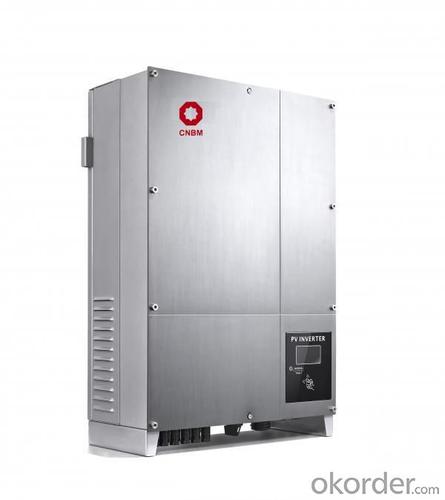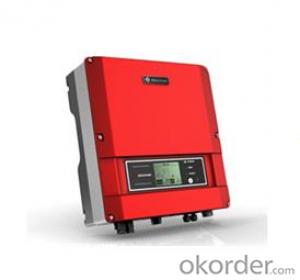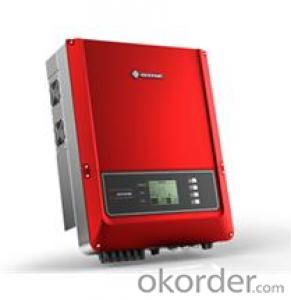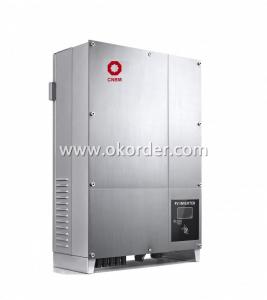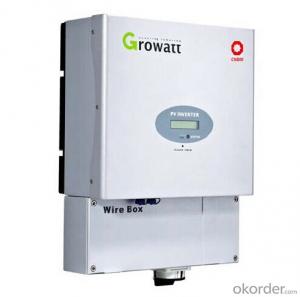Solar Inverter 2000W Grid Tied 3-Phase CNBM-20000UE
- Loading Port:
- NanJing
- Payment Terms:
- TT
- Min Order Qty:
- 1 set pc
- Supply Capability:
- 3000 per month pc/month
OKorder Service Pledge
OKorder Financial Service
You Might Also Like
Features of Grid Tied Solar Inverter 3-Phase CNBM-20000UE
CNBM International Corporation (CNBM International) is the most important trading platform of CNBM Group Corporation, a state-owned company under the direct supervision of State-owned Assets Supervision and Administration Commission of the State Council.
With a R&D team more than 100 engineers,40% of the staff, who has been deeply engaged in the photovoltaic industry for 10 years, CNBM takes the mission to increase the inverter availability and efficiency, putting continuous innovation to make CNBM inverter easier for installation and operation, and more cost-effective for solar plant construction. The full range of CNBM single phase inverters has received VDE, CE, G83/1, G59/2, ENEL2010, VDE4105, C10/C11, AS4777 etc.
Maximum efficiency of 97.8% and wide input voltage range, Internal DCswitch,MTL-String, Sound control,Bluetooth/RF technology /WiFiTransformerless,GT topology
The Grid Connected Solar Inverter we can offer is 1.5kw to 20kw.
Introduction of Grid Tied Solar Inverter 3-Phase CNBM-20000UE
Maximum efficiency of 97.8% and wide input voltage range
Integrated DC switch-disconnected
MTL-String
Sound control
Bluetooth/RF technology /Wi-Fi
Transformerless GT topology
5 years warranty (10 years as optional)
Technical data of Grid Tied Solar Inverter 3-Phase CNBM-20000UE
Model | CNBM-18000UE | CNBM-20000UE | |
Input data (DC) |
|
| |
Max. DC power | 18700W | 20800W | |
Max. DC voltage | 1000V | 1000V | |
Start voltage | 350V | 350V | |
PV voltage range | 180V-1000V | 180V-1000V | |
Max. input current | 23A | 26A | |
Number of MPP trackers /strings per MPP tracker | 2/3 | 2/3 | |
Output (AC) |
| ||
Rated AC output power | 18000W | 20000W | |
Max. AC power | 18000VA | 20000VA | |
Max. output current | 28.6A | 32A | |
Power factor | 1 | 1 | |
THDI | <3% | <3% | |
AC connection | Three phase | Three phase | |
Efficiency |
| ||
Max. efficiency | 98% | 98% | |
Euro weighted efficiency | 97.5% | 97.5% | |
MPPT efficiency | 99.5% | 99.5% | |
Protection devices |
| ||
Output over voltage protection-varistor | yes | yes | |
Ground fault monitoring | yes | yes | |
Grid monitoring | yes | yes | |
General Data |
| ||
Dimensions (W / H / D) in mm | 740/440/235 | 740/440/235 | |
Weight | 60KG | 60KG | |
Operating temperature range | –25°C ... +60°C | –25°C ... +60°C | |
Altitude | 2000m(6560ft) without derating | ||
Self-Consumption night | < 0.5 W | < 0.5 W | |
Topology | Transformerless | ||
Cooling concept | Natural | Natural | |
Environmental Protection Rating | IP65 | IP65 | |
Features |
| ||
DC connection | H4/MC4(opt) | H4/MC4(opt) | |
Display | LCD | LCD | |
Interfaces: RS485/RS232/Bluetooth / RF/Zigbee/Wifi | yes/yes/opt/opt/opt | ||
Warranty: 5 years / 10 years | yes /opt | ||
Certificates and approvals | CE、VDE 0126-1-1、DK5940、G83/1-1、G59/2、RD1663、EN50438、 VDE-AR-N4105、CEI-021、IEC-62109、ENEL-Guide | ||
Grid Tied Solar Inverter 3-Phase CNBM-20000UE is simple national setting of line supply monitoring, Easy country configuration, with Multi-language,display, currently available for most of the countries over the world.With technical creativity and scientific management, the factory established first class R&D and test centers, as well as management and R&D teams comprising of PhDs and masters with overseas qualification.
Figure 1 the application of Grid Tied Solar Inverter 3-Phase CNBM-20000UE
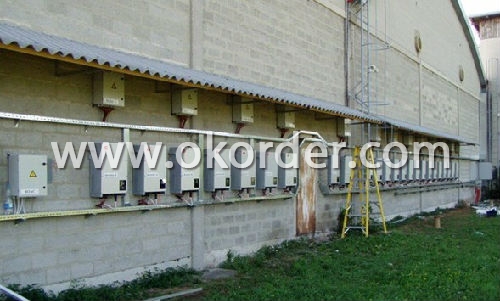
Figure 2 The Stock of Grid Tied Solar Inverter 3-Phase CNBM-20000UE
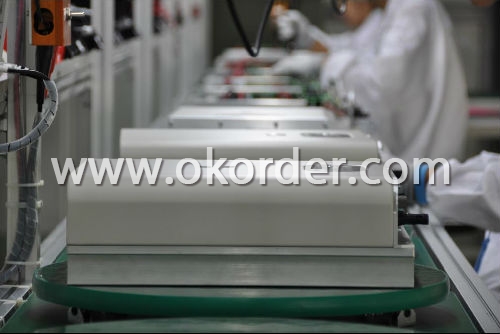
- Q: What is the difference between a string inverter and a micro inverter?
- A string inverter is a type of inverter that is connected to a string of solar panels, converting the DC power generated by the panels into AC power for use in the electrical grid. On the other hand, a micro inverter is a smaller and individual inverter that is attached to each solar panel, converting the DC power directly at the panel level. The main difference between the two is that a string inverter operates at the string level, which means if one panel in the string is affected by shade or malfunction, the entire string's performance is affected. In contrast, with micro inverters, each panel operates independently, allowing for higher energy production and better performance in situations where panels are subjected to shading or varying conditions.
- Q: What is the role of a power optimizer in a solar inverter?
- The role of a power optimizer in a solar inverter is to maximize the energy output of each individual solar panel in a solar power system. It works by continuously monitoring and optimizing the performance of each panel, ensuring that it operates at its maximum power point. This helps to overcome shading, mismatch, and other factors that can negatively impact the overall system efficiency. By optimizing the power output of each panel, power optimizers enhance the overall energy production of the solar power system, leading to increased electricity generation and improved system performance.
- Q: What are the installation requirements for a solar inverter?
- The installation requirements for a solar inverter typically include a stable mounting surface, proper ventilation and clearance space, a compatible electrical connection, and compliance with local building codes and regulations. Additionally, the solar inverter should be installed in a location that receives adequate sunlight for efficient operation.
- Q: Can a solar inverter be integrated with energy management systems?
- Yes, a solar inverter can be integrated with energy management systems. In fact, many modern solar inverters are designed to be compatible with energy management systems, allowing for better monitoring, control, and optimization of the energy generated by the solar panels. This integration enables users to track their energy production, consumption, and storage, and make informed decisions on energy usage to maximize efficiency and cost savings.
- Q: Can a solar inverter be installed in a residential area?
- Yes, a solar inverter can be installed in a residential area. In fact, it is common for residential homes to have solar inverters installed as part of a solar energy system to convert the direct current (DC) generated by the solar panels into alternating current (AC) that can be used to power household appliances and lighting.
- Q: Can a solar inverter convert DC power to AC power?
- Yes, a solar inverter can convert DC power generated by solar panels into AC power that is suitable for use in homes and businesses.
- Q: What is the role of a solar inverter in net metering?
- The role of a solar inverter in net metering is to convert the direct current (DC) electricity generated by solar panels into alternating current (AC) electricity that can be used to power household appliances or fed back into the electric grid. It ensures that the electricity produced by the solar panels is synchronized with the grid's voltage and frequency. Additionally, the solar inverter allows for the measurement and tracking of the energy generated and consumed, enabling accurate net metering calculations and billing.
- Q: How do I monitor the performance of a solar inverter?
- To monitor the performance of a solar inverter, you can follow these steps: 1. Install monitoring software: Most solar inverters come with monitoring software that allows you to track their performance. Install this software on your computer or use the manufacturer's online platform. 2. Connect to the inverter: Connect your computer or smartphone to the solar inverter using the provided communication interface, such as Wi-Fi, Ethernet, or RS485. This connection enables you to receive real-time data from the inverter. 3. Monitor energy production: Once connected, you can monitor the energy production of your solar inverter. The software will display crucial data like energy output, daily energy generation, and historical performance. This information helps you track the efficiency of your solar system. 4. Analyze system performance: Use the monitoring software to analyze the performance of your solar inverter. Identify any abnormalities or issues that may affect its efficiency. Make note of any error codes or alerts reported by the software and address them promptly. 5. Set up alerts and notifications: Configure the monitoring software to send you alerts and notifications. These can inform you about any significant changes in performance, such as a sudden drop in energy production or a fault in the system. It allows you to take prompt action and ensure optimal performance. 6. Regularly review data: Periodically review the data collected by the monitoring software. Compare current performance with historical data to identify any long-term trends or changes. This analysis can help you optimize your solar system's performance and detect any potential maintenance requirements. By following these steps, you can effectively monitor the performance of your solar inverter and ensure its efficient operation.
- Q: What is the maximum number of parallel inverters that can be installed in a solar system?
- The maximum number of parallel inverters that can be installed in a solar system depends on various factors such as the size and capacity of the solar system, the availability of space, and the electrical requirements of the installation. There is no fixed maximum number as it can vary significantly depending on these factors.
- Q: Can a solar inverter be used with a solar-powered heating system?
- Yes, a solar inverter can be used with a solar-powered heating system. A solar inverter converts the DC power generated by solar panels into AC power that can be used for various applications, including heating systems. By connecting the solar inverter to the solar panels and the heating system, the generated solar power can be efficiently utilized to provide heat for the system.
Send your message to us
Solar Inverter 2000W Grid Tied 3-Phase CNBM-20000UE
- Loading Port:
- NanJing
- Payment Terms:
- TT
- Min Order Qty:
- 1 set pc
- Supply Capability:
- 3000 per month pc/month
OKorder Service Pledge
OKorder Financial Service
Similar products
Hot products
Hot Searches
Related keywords



